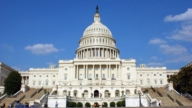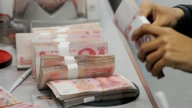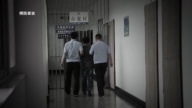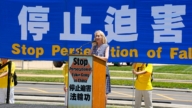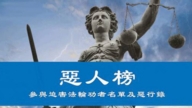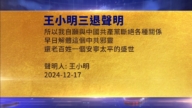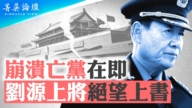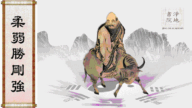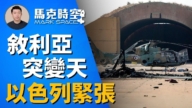【新唐人2014年08月25日訊】在大陸無官不貪的大環境之下,身為當局錢袋子之一的「國有企業」貪腐更為嚴重,頻頻爆出各種醜聞。日前,中共國家主席習近平發話,要對國企高管的過高收入進行調整。外界分析,國企很有可能成為習近平反腐的下一波重點對像。也有評論認為,習近平在拿下大批江派高官之後,開始回過頭來試圖解決中國經濟難題。
22號,大陸《南方都市報》報導,廣州市「白雲農工商聯合公司」原總經理張新華,涉嫌貪污受賄高達近4億元,雖然他只是處級官員,卻創下了廣州辦案機關披露的貪腐金額記錄。
此前不久,上海光明集團原董事長王宗南因涉嫌挪用公款、受賄,被逮捕。而自今年以來,已有華潤集團原董事長宋林、中國出版集團原副總裁王俊國等,超過40名國企高管被查處。
但這只是國企貪腐的冰山一角。實際上,中國大陸幾乎每一家國企都貪腐成風。除了在審批、招標等環節上大肆貪污、受賄之外,各國企高管更是以所謂「職務消費」為名,上演「不落腰包的腐敗」,堂而皇之的坐豪車、住豪華酒店、進出高檔休閒會所。
大陸252家國有A股上市公司年報數據顯示,僅2012年一年,這些企業公開的招待費就達65億元。而2009年被判死緩的中石化原董事長陳同海,更曾爆出每天「職務消費」高達4萬元。
這個月18號,中共國家主席習近平在「中央全面深化改革領導小組」第四次會議上表示,要規範國有企業收入分配秩序,對不合理的偏高、過高收入進行調整。他強調,將嚴格規範中央企業負責人履職待遇、業務支出,除了國家規定以外,國企負責人沒有其他的「職務消費」。
《新唐人》特約經濟評論專家傑森:「國營企業老總很多時候都是官二代,或者說是有背景的,紅三代之類的。歷史上對於國營企業老總的工資怎麼做這樣的事情,甚至連提都不敢提,只是有爭議。」
《新唐人》特約經濟評論專家傑森表示,國企本身就是中共一黨專制下的怪胎,而國企老總則是怪胎的衍生物。他們作為中共官員,根本不懂經營,但因為有當局的政策支持、國企的壟斷地位,而保證國企只賺不賠,所以這些國企高管養尊處優,形成了利益集團。
傑森分析,對於習近平來說,他前一段時間拿下了江澤民派系的一些高官,為自己立了威,所以現在敢於把國企老總的工資往下拉。
傑森:「他很可能一方面穩固前一段時間政治鬥爭中的一些抵抗力量,同時的話,他可能會回過手來,解決中國經濟上的一些問題。但中國的經濟問題是錯綜複雜的,很難一時解決清楚,解決不了的話,唯一能做的就是平一點民憤。」
大陸經濟學家楊斌也表示,當局一方面嚐試縮減國企老闆的錢袋子,一方面又不想進行根本制度上的變革,一直在不斷給予國企各種政策扶持和優惠,聲稱要「加強國企活力」。
大陸經濟學家楊斌:「而國企恰恰是沒有活力的東西、很殭化的東西,你非得增加它的活力。而民企是很活躍的東西,你不給它輸血。這就是本末倒置了。所以說,最主要問題是這個。」
香港《南華早報》最近報導稱,大陸主要國企,尤其是金融領域部分高管將面臨減薪一半。大陸媒體報導說,目前上海、北京、廣東等多地已出臺方案,將嚴格規範國企高管薪資。
採訪/陳漢 編輯/李謙 後製/李智遠
Xi Jinping Moves Anti-corruption Campaign To State-owned Enterprises
Corruption has become ubiquitous among the Chinese
Communist Party (CCP) officials.
As a major fund source of the CCP, corruption in state-owned
enterprises is especially serious where scandals
had been continuously exposed recently.
Not long ago, the CCP president Xi Jinping said changes
will be made on excessively high incomes of executives
of state-owned enterprise.
Commentators thus speculate state-owned companies
will be the next target of Xi’s anti-corruption campaign.
Some also say that after a massive take down
of Jiang Zemin’s followers, Xi is now turning back to solve
the difficulties in China’s economy.
On Aug. 22, Southern Metropolis Daily reported that
Zhang Xinhua, former general manager of the Baiyun Farm
Industry and Commerce Enterprise,
was suspected of embezzling 400 million yuan ($65 million).
Although Zhang is only a divisional-level official,
he sets the record of involving the biggest amount of money
among Guangzhou’s corruption cases.
Not long before, former chairman of Shanghai Bright Food
Group Wang Zongnan was arrested on embezzlement
and bribery charges.
Since 2014, over 40 senior officials of state-owned
enterprises had been investigated, including former
chairman of Huarun Group Song Lin and vice president
of the China Publishing Group Wang Junguo.
However, those are only the tip of the iceberg.
The truth is, almost every CCP state-owned company
has serious corruption problems in biding and approving
procedures of projects.
Senior officials also use public funds for their own
enjoyment without direct embezzlement.
In the name of “business expenditure,” they openly enjoy
luxury cars, luxury hotels and top-grade clubhouses.
Annual reports show that 252 state-owned listed companies
of A-shares had spent 6.5 billion Yuan ($1.1 billion)
as entertainment costs only in the year of 2012.
Chen Tonghai, the ex-boss of Sinopec who was sentenced
to death with reprieve in 2009, reportedly spent
40,000 Yuan ($6,500) per day as “business expenditures.”
On Aug. 18, Xi Jinping gave a talk in the fourth meeting
of the Central Leading Group for Comprehensively
Deepening Reforms.
Xi said, state-owned enterprises need to regulate their
income distribution and trim off excessively high incomes.
Xi stressed that strict regulations will be applied to leaders
of state-owned companies, as well as their incomes
and business expenditures.
No “business expenditures” will be allowed except
those subject to state rules.
Jason Ma, economic commentator of NTDTV: “Many
state-owned enterprise leaders are children of CCP officials
or with special background.
In the CCP’s history, no one ever had the courage to talk
about regulating their incomes.
There were only discussions in private talks.”
Jason Ma said state-owned companies are intrinsically
oddballs born from the CCP’s single-party dictatorship.
The leaders of these “oddballs” are simply party officials
and know nothing about management.
However, state-owned companies are monopolies
protected by the CCP’s policies, and thus never take
any risks or losses.
In such a situation, their leaders form interest groups
that always enjoy luxury and privilege.
Jason Ma commented that Xi Jinping established his
authority by striking down a group of high officials from
Jiang Zemin’s group;
Therefore now he has the courage to call a salary cut
of those state-owned enterprise leaders.
Jason Ma: “Probably on one hand, Xi is stabilizing powers
that resisted him in the struggle not long ago.
On the other hand, he may be turning back to solve
some economic problems.
However, China’s economic problems are very complicated.
It is difficult to solve them all at once.
All he can do is only to ease public anger by a little bit.”
Chinese economist Yang Bin said despite pay cuts
on state-owned company bosses, the CCP still refuses
to make any fundamental reforms on its system.
It keeps giving support to state-owned ones with favorable
policies, claiming to be “energizing them.”
Yang Bin, Chinese economist: “State-owned companies
are exactly the ones with no energy.
They are very inflexible.
But the CCP tries to energize them instead of private ones,
which were born with real energy.
This puts the cart before the horse and that is where
the real problem is at.”
Hong Kong-based South China Morning Post recently
reported that senior officials of the CCP’s major
state-owned companies, particularly those in financial field,
will face a 50 percent salary cut.
Chinese media also said, Shanghai, Beijing, Guangdong
and other places introduced plans of strictly regulating
income of state-owned company leaders.
Interview/ChenHan Edit/LiQian Post-Production/Li Zhiyuan


